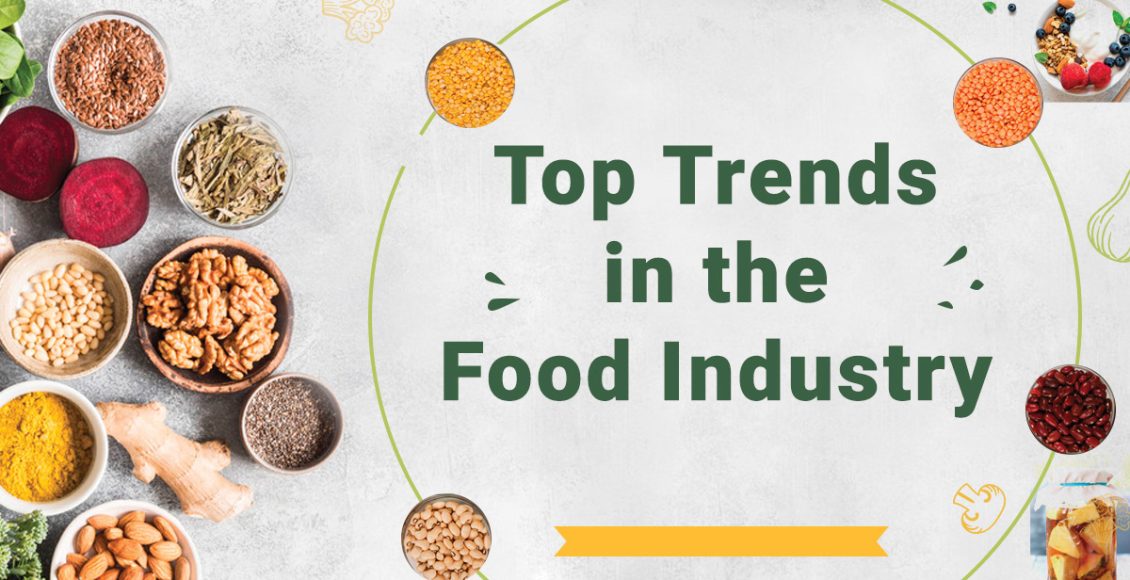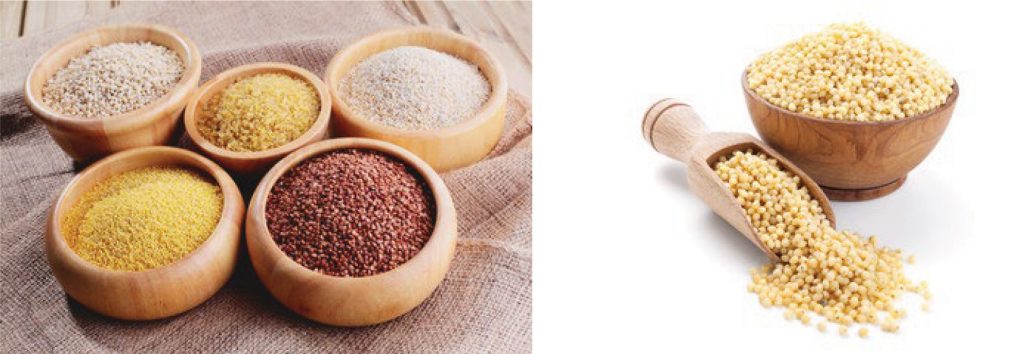
Top Trends in the Indian Food Industry
India’s food and beverage sector is presently experiencing notable growth in its extent and variety. Constituting approximately 3% of the nation’s GDP and dominating nearly two-thirds of the retail market, this expansion is fuelled by urbanization, escalating disposable incomes, and shifting eating and lifestyle patterns among millennials. Moreover, the internet and e-commerce have given rise to indigenous brands specializing in clean-label food products customized to fulfill specific dietary and nutritional needs.
The future appears auspicious for the food and beverage industry, and numerous trends in this sector are anticipated to gain popularity in 2024. Let’s delve into these emerging trends:
Trends:
- Upcycled products.
- Fortified products
- Plant-based products
- Shift towards super grains consumption
- High protein foods
- Flavour trends
- Probiotic and Fermented drinks
- Healthy snacking and meal replacers
- Shift from refined sugar and highly processed food
- Upcycled products
Upcycling is a prominent trend in the food industry, offering a sustainable solution to combat waste. This innovative approach involves the conversion of conventional waste into valuable products, showcasing a commitment to environmental responsibility. Numerous businesses are embracing upcycling by repurposing food ingredients and byproducts, creating a range of inventive and eco-friendly goods.
Examples abound, from crafting chips from ripe bananas to using watermelon and sunflower seed flour for delectable chocolate brownies. Cascara (Coffee berry fruit husks) are transformed into refreshing drinks, while cacao fruit produces whole-fruit chocolate. Even spent grain from beer brewing finds a second life as regained super grain for snack bars. By-products of Plant-based milk create high-fiber, gluten-free flour for cookie mixes, and surplus bread is ingeniously repurposed into beer.
This shift towards upcycling aligns seamlessly with the growing emphasis on circular economies, where agricultural byproducts are maximized to support a more resource-conscious and environmentally friendly food production system. As consumers increasingly prioritize sustainability and ethical choices, the trend of repurposed food items is expected to experience sustained growth, catering to the demands of a conscientious market.
- Fortified products
A significant proportion of India’s population grapples with prevalent vitamin and mineral deficiencies, with over 70 percent of individuals still falling short of consuming half of their Recommended Dietary Allowance (RDA) for micronutrients. Notably, one-third of the global population suffering from these deficiencies, totaling two billion people, resides in India. A promising solution to combat this widespread nutritional challenge is fortifying staple foods, a method deemed effective, scalable, affordable, and sustainable.
Food fortification involves the addition of crucial micronutrients to staple foods, offering a complementary approach to diet diversification in meeting daily nutritional requirements. This strategy bridges nutritional gaps seamlessly, requiring no alterations in the food’s taste, texture, or flavor, thereby minimizing the need for behavioral changes.
According to Food Safety and Standards Regulations 2018, fortifying staples is not mandatory, but if Food Business operators want to fortify and use the +F logo, they shall fortify their commodities as per the regulations. The Iodization of salt is mandatory. FSSAI has specified the standards for fortifying staples with certain essential micronutrients. These are:
| Product | Fortified with |
| Wheat Flour | iron, folic acid, and Vitamin B12 |
| Rice | iron, folic acid, Vitamin B1, and Vitamin B12 |
| Milk | Vitamin A and D |
| Edible Oils | Vitamin A and D |
| Salt | Iodine and Iron |
Notably, food companies play a pivotal role in providing consumers with convenient options to enhance nutrient intake through fortified products. As awareness of preventive healthcare grows, the fortified foods market is poised for development, driven by an increasingly health-conscious and nutrition-aware customer base. This trend reflects a positive stride towards addressing nutritional deficiencies on a larger scale, potentially transforming the public health landscape in India.
- Plant-based Food
Plant-based food processing companies are innovating to meet growing consumer demand for sustainable and healthy alternatives. With a focus on clean labels and minimal processing, companies, and startups are creating diverse plant-based products, from burgers, snacks, and meat to dairy alternatives such as milk, ice cream, and desserts. On the consumer side, there’s a shift towards embracing plant-based diets for health, environmental, and ethical reasons. Switching to a plant-based diet can reduce an individual’s annual carbon footprint by up to 2.1 tons with a vegan diet or up to 1.5 tons for vegetarians (United Nations Report). The future trend of plant-based food lies in continued product diversification, improved taste and texture, and increased accessibility. As technology advances, we expect more sophisticated plant-based options, contributing to a mainstream shift towards plant-centric diets and sustainable food choices.

- Shift toward super grains
A discernible trend in food processing and consumer preferences reveals a notable shift towards super grains, notably millets, due to their elevated nutritional profile, minimal environmental impact, and versatile applications in various food products. The year 2023 was designated the “International Year of Millets” with the theme “Healthy Millets, Healthy People,” aimed to raise awareness about millets’ significance and health benefits, promoting their production, consumption, and value addition in food products. This initiative has been notably successful in India, leading to the emergence of numerous startups that, with minimal investments, have generated significant revenue and contributed to job creation. Increasing consumer awareness of millet’s health advantages is driving a surge in demand, indicating a sustained rise in millet’s prominence in the food industry as consumers prioritize sustainable and health-conscious dietary choices.

- High-protein Foods
The recommended protein intake for an average adult in India is 0.8 to 1 gram per kilogram of body weight, yet the current average intake is approximately 0.6 grams per kilogram. This signifies a deficiency in protein consumption among Indians. However, the food industry is witnessing a surge in demand from consumers and producers for high-protein foods. Businesses are strategically broadening their product portfolios to meet the growing needs of health-conscious consumers. Startups are actively capitalizing on this trend by introducing protein-rich snacks, plant-based alternatives, protein-infused beverages, and collaborations with health and fitness apps. Simultaneously, consumers increasingly seek protein-rich products to fulfill wellness goals and fitness aspirations. The sustainability of this trend is contingent upon businesses consistently innovating and adapting to evolving consumer expectations for protein-rich and healthier choices. Future projections in the food industry emphasize a lasting commitment to health and nutrition, exemplified by the escalating significance of high-protein offerings.
- Flavor Trends
A paradigm shift is evident in customer taste preferences within the food processing industry, as firms increasingly favor natural flavors over artificial counterparts. Processing companies prioritize natural flavor formulations when responding to heightened consumer demand for clean-label products. Innovative startups strategically capitalize on this trend by incorporating regional, cultural, fusion, and authentic flavors, including health-focused elements like turmeric and ginger. The consumer shift towards natural ingredients is driven by sustainability and health concerns, as individuals seek genuine flavors and transparency in their food choices. Future projections suggest an acceleration of this trend, with the industry investing in cutting-edge technologies and natural extraction methods to create enticing flavors, meeting the rising demand for health-conscious options. Anticipated flavor trends will center on the sustained use of natural ingredients, aligning with consumers’ desires for authentic, healthful food options, thereby shaping the future landscape of flavor preferences.
- Probiotic and Fermented Drinks
In 2022, the Indian probiotic drinks market was valued at INR 955 million, projected to reach INR 2,782 million by 2028, with a 20.1% CAGR from 2023-2028 (IMARC Group). Fuelled by the growing interest in gut health, processing firms have introduced innovative products like kefir, kimchi, and kombucha, known for their unique flavors and digestive benefits. Startups capitalize on this trend with flavor innovations, regional focus, local ingredients, and plant-based offerings. As the industry evolves, probiotic drinks may become functional beverages with adaptogens. Anticipate heightened demand for diverse strains and eco-friendly manufacturing in this dynamic beverage sector.

- Healthy snacking and Meal replacers
The food industry is witnessing a surge in the popularity of healthy snacks due to heightened consumer demand for nutritious options. Consumers, increasingly health-conscious, Favor wellness-oriented snacks, driving a positive outlook for the future of healthy snacking. Startups leverage innovative flavors to cater to diverse tastes, offering popular options like kale chips, Greek yogurt with fruit, hummus with vegetable sticks, baked and air-fried chips, and natural ingredient-based energy bars. The demand for quick and wholesome substitutes has also fueled interest in meal replacements. Both industry leaders and startups are responding with sustainable packaging, personalized nutrition, and plant-based proteins, reflecting a transformative shift towards convenient, health-conscious eating.

- Shift from refined sugar and highly processed food
The food industry and consumer behavior align with a growing trend away from refined sugar and highly processed foods. Emphasizing healthier alternatives, the industry is turning to natural sweeteners such as stevia, monk fruit, and erythritol, providing a wholesome option without compromising taste. Startups are leveraging this trend by utilizing alternatives like honey, jaggery, and maple syrup, promoting cold-pressed juices, incorporating whole grains, and emphasizing clean labels to avoid additives. Consumers, increasingly health-conscious, actively seek products with these natural sweeteners, signaling a shift in dietary choices. This trend is expected to persist and strengthen as the food industry and consumers prioritize more sustainable and balanced nutrition.
The food industry has responded to evolving consumer preferences, emphasizing clean, nutrient-rich, and natural food as integral to contemporary healthy eating. Promoting these trends advocates for a health-conscious lifestyle, underscoring the importance of mindful eating, as good food serves as medicine and health functions as the guiding principle. Embrace this surge in healthy eating for transformative well-being.
Author

Connect with Authors at: E-mail foodbiz@sathguru.com
 Grow Beyond
Grow Beyond 

